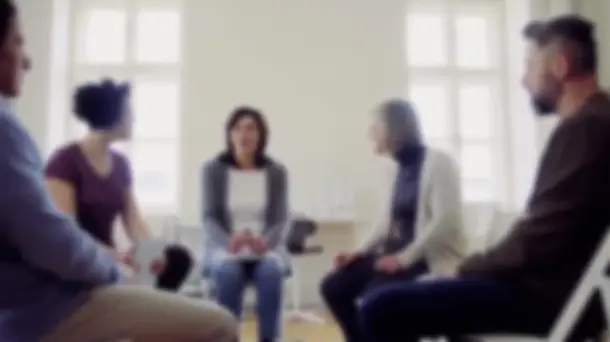Welcome to Narcotics Anonymous
What is our message? The message is that an addict, any addict, can stop using drugs, lose the desire to use, and find a new way to live. Our message is hope and the promise of freedom.

“When new members come to meetings, our sole interest is in their desire for freedom from active addiction and how we can be of help.”
It Works: How and Why, “Third Tradition”
Is NA for me?
This is a question every potential member must answer for themselves. Here are some recommended resources that may be helpful:
Need help for family or a friend?
NA meetings are run by and for addicts. If you're looking for help for a loved one, you can contact Narcotics Anonymous near you.
Subscribe to NAWS Emails
Sign up to receive Just for Today and SPAD daily meditation emails, as well as NAWS News, NAWS Updates, and more.
Never before have so many clean addicts, of their own choice and in free society, been able to meet where they please, to maintain their recovery in complete creative freedom.
Basic Text, “We Do Recover”
Recovery Quicklinks:
Service Quicklinks:
Narcotics Anonymous sprang from the Alcoholics Anonymous Program of the late 1940s, with meetings first emerging in the Los Angeles area of California, USA, in the early Fifties. The NA program started as a small US movement that has grown into one of the world's oldest and largest organizations of its type.
Today, Narcotics Anonymous is well established throughout much of the Americas, Western Europe, Australia, and New Zealand. Newly formed groups and NA communities are now scattered throughout the Indian subcontinent, Africa, East Asia, the Middle East, and Eastern Europe. Narcotics Anonymous books and information pamphlets are currently available in 49 languages.
Information About NA
Daily Meditations
Just for Today
March 02, 2026 |
Success |
| Page 64 |
| “Any form of success was frightening and unfamiliar.“ |
| Basic Text, p. 14 |
| Before coming to NA, few of us had much experience with success. Every attempt to stop using on our own had ended in failure. We had begun to give up hope of finding any relief from active addiction. We had grown accustomed to failure, expecting it, accepting it, thinking it was just part of our makeup. When we stay clean, we begin to experience success in our lives. We begin to take pride in our accomplishments. We start to take healthy risks. We may take some knocks in the process, but even these can be counted as successes if we learn from them. Sometimes when we fulfill a goal, we hesitate to “pat ourselves on the back” for fear that we will seem arrogant. But our Higher Power wants us to succeed, and wants us to share with our loved ones the pride we take in our accomplishments. When we share our successes with others in NA, they often begin to believe that they can achieve their goals as well. When we succeed, we help lay the groundwork for others who follow in our path. |
| Just for Today: I will take time to savor my successes. I will share my victories with an “attitude of gratitude.” |
A Spiritual Principle a Day
March 02, 2026 |
Vigilance in Balance |
| Page 64 |
| “We hang on fiercely, mistaking the attempt to control all the variables in our lives for vigilance in our recovery.“ |
| Living Clean, Chapter 1, “Growing Pains” |
| As with character assets or defects, many spiritual principles have a flip side. Too much of a good thing can take us down an unintended path. Ideally, practicing vigilance is being reflective and real about our progress, monitoring our program's balance with outside responsibilities, and keeping an eye out for possible danger zones. But if we turn the vigilance coin over, we may find ourselves being fearful of change once again or desperately trying to puzzle out all possible scenarios of a situation before it even happens. “I look at vigilance like a fence to protect myself from danger,” a member quipped. “I know I'm getting out of hand, hypervigilant even, when I'm constantly repainting the fence, fortifying it with more and more materials so that I can't see out and no one can see in, and then patrolling the perimeter 24/7. All I need, really, is the fence.” Vigilance does not equal control. It's an awareness we can practice daily, reminding us of the severity of this disease and of the horrors of our last days of using. And, of course, this awareness extends beyond the past to our present: No matter how much time we have clean, we best serve our recovery and our well-being if we remain open and flexible. We keep members close who will help keep us accountable by alerting us if our fence has come down too low or is built too high to let anyone in. Even though we're clean today, we're still powerless over many things. We don't do ourselves any favors by having unrealistic expectations or being overly watchful of how others are working their program. We're not failing if we stray from practicing principles perfectly. We can't build an impenetrable fortress against danger, challenges, or change. Our goal is to stay clean today, take action on what's in front of us, and stay out of the result. |
| ——— ——— ——— ——— ——— |
| I will make sure to temper my vigilance with surrender, willingness, and open-mindedness. I'll take care of my “fence”–but I won't obsess about it. Not today, anyway. |
Do you need help with a drug problem?
“If you’re new to NA or planning to go to a Narcotics Anonymous meeting for the first time, it might be nice to know a little bit about what happens in our meetings. The information here is meant to give you an understanding of what we do when we come together to share recovery…”
Subscribe to NAWS Emails
Sign up to receive NAWS Updates and NAWS News emails as well as Just for Today and SPAD daily emails.



